|
|
|
Sort Order |
|
|
|
Items / Page
|
|
|
|
|
|
|
| Srl | Item |
| 1 |
ID:
108797
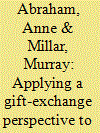

|
|
|
|
|
| Publication |
2011.
|
| Summary/Abstract |
This article examines the differing meanings of volunteering that underlie the management of volunteers in diverse cultural contexts by analyzing a case study of an Australian non-government organization (NGO) working in Papua New Guinea (PNG), where local volunteers are engaged in a number of its programs. The results indicate that gift-exchange theory may be a fundamental influence shaping attitudes towards volunteering by PNG nationals. This has led to the development of a gift-exchange model to assist other Western-based NGOs to manage formal volunteering in Pacific nations in a way that is both effective and culturally appropriate.
|
|
|
|
|
|
|
|
|
|
|
|
|
|
|
|
| 2 |
ID:
103543


|
|
|
|
|
| Publication |
2011.
|
| Summary/Abstract |
The proposed introduction of National Citizen Service (NCS) by the Conservative party survived the negotiations with the Liberal Democrats and forms part of the coalition's policy agenda. The idea forms part of the concern of Cameronian Conservatives to create a big society, based primarily upon volunteering and civil engagement. Drawing upon comparisons with state and private sector-led models of citizen volunteering in Germany and the United States, this article explores the evolving rationale for the introduction of NCS and evaluates the issues and pitfalls which may arise.
|
|
|
|
|
|
|
|
|
|
|
|
|
|
|
|
| 3 |
ID:
160501
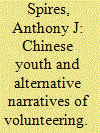

|
|
|
|
|
| Summary/Abstract |
Over the past 20 years, volunteering has developed as a new field for governmental control and regulation of an emergent civil society. This article draws on interviews with 60 young volunteers in southern China, mostly university students and recent graduates. I contrast their experiences in off-campus, youth-led voluntary associations with the officially approved student organizations of normal university life. I argue that the instrumental organization of volunteers characterizes the party-state’s efforts to funnel youthful enthusiasm and compassion into particular political projects and officially prescribed goals. Unhappy with the ‘formalistic’ nature of these activities, youth engaging in bottom–up volunteer initiatives articulate other priorities, including a strong desire for meaningful, personal engagement that state-led programmes and university student organizations are typically unable to provide.
|
|
|
|
|
|
|
|
|
|
|
|
|
|
|
|
| 4 |
ID:
156083
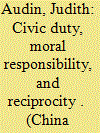

|
|
|
|
|
| Summary/Abstract |
This paper, which is based on ethnographic field research, analyses the system of resident-volunteers in the neighbourhoods of Beijing. Between co-optation networks, surveillance missions, ritualised practices, and ordinary exchanges of sociability amongst neighbours, volunteering is an interesting form of citizen participation in urban China. The volunteer networks are made up of inhabitants who are selected and involved through the norms of civic duty, personal acquaintance, moral obligation, or persuasion, in order to contribute to the production of local public order. Finally, this specific form of voluntarism reveals, from the perspective of retired people, how shared socio-political practices are created and perpetuated within an institutional volunteering system.
|
|
|
|
|
|
|
|
|
|
|
|
|
|
|
|
| 5 |
ID:
155715
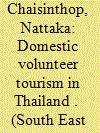

|
|
|
|
|
| Summary/Abstract |
This article explores domestic volunteer tourism in Thailand and how it relates to moral politics and recent political struggles. Volunteer tourism typically entails middle class Thais, who reside in the country's capital or other urban cities, traveling to remote villages to perform volunteering activities. Through an ethnographic account, the article shows how these trips provide an opportunity for volunteers to experience and embody the ideals associated with the notion of the ‘volunteer spirit’ and how volunteer tourist trips tend to reproduce the kind of subjectivity and power relations that help to preserve, rather than challenge, the political status quo. In particular, the article highlights the ways in which popular volunteer discourse and practice correlate closely with the politics of ‘good people’ (khon di), which promotes ‘moral rule’ by ‘good people’ rather than a more democratic and inclusive kind of politics.
|
|
|
|
|
|
|
|
|
|
|
|
|
|
|
|
| 6 |
ID:
155718
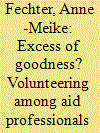

|
|
|
|
|
| Summary/Abstract |
This article explores the meaning of volunteering among professional aid workers. While they experience disenchantment in their daytime work, volunteering provides them with benefits lacking in their paid jobs. At the same time, a compensatory model does not capture the complex dimensions of this relationship. One motive behind their professional work – bringing about positive change for others – is also the driving force behind their voluntary practices. Such excess of doing good may be indicative of their overall commitment. If aid workers make sense of their actions within a framework of alienated labour, rendering their waged aid work as a commodity, volunteering emerges as a remedial response. At the same time, their paid and unpaid work is animated by the impulse of giving. Such co-existence implies that gifts and commodities are not mutually exclusive; or indeed that both can be understood, following Parry (1986), as emerging from a highly developed capitalist system.
|
|
|
|
|
|
|
|
|
|
|
|
|
|
|
|
| 7 |
ID:
148234
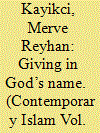

|
|
|
|
|
| Summary/Abstract |
In this article, I look into a case study of a kermes (kermis) to see how Islamic discourses can structure and re-structure an apparently mundane practice. The aim is to see how a mundane activity is transformed into an act of piety, simply because it is driven by a religious intention. Additionally, we study how this intention supported by the articulation of a particular interpretation of an Islamic tradition. Ultimately, the goal is to understand how the kermes is converted into a disciplined practice of moral construction, ethical conduct and allows for the fulfillment of religious and non-religious responsibility and, consequently, how a moral discourse can embed a completely mundane practice and transform it into an ethical cycle of self-development, sacred duty and gift giving. This study fills a gap in the literature on volunteering as it examines how practices of volunteering are developed according to a discourse of piety and are the result of a process of active decision-making, according to the context in which the volunteers live. The data for this research was gathered through participant observation and dialogue.
|
|
|
|
|
|
|
|
|
|
|
|
|
|
|
|
| 8 |
ID:
180210
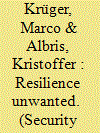

|
|
|
|
|
| Summary/Abstract |
This article conceptualizes resilience as an emergent and contingent practice that shapes societal relationships in unexpected ways. It focuses on the case of the 2013 floods in Dresden, a city that witnessed three major floods within 11 years. Emergent volunteer activities on the ground and on social media played a significant role during the flood emergency response efforts. Drawing on Philippe Bourbeau’s definition of resilience as a process of patterned adjustment, the article regards these emergent structures as incidents of resilience. In the case of Dresden, not only was resilience not explicitly requested by the state, but it was in several incidents actively not wanted. While most of the volunteering activities arising from social media platforms intended to support the disaster management authorities, the case shows how subversive forms of resilience were mobilized to resist official plans. They finally urged authorities to adapt to a new social and technological reality in order to render unaffiliated volunteering governable. Resilience thus emerges as an adaptive process that shapes and is shaped by societal relations. The article thus seeks to add another facet to the debate on resilience by demonstrating how resilience helps us to make sense of complex and interdependent adaptation processes.
|
|
|
|
|
|
|
|
|
|
|
|
|
|
|
|
| 9 |
ID:
079581
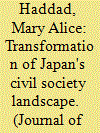

|
|
|
| 10 |
ID:
167073
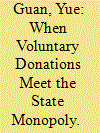

|
|
|
|
|
| Summary/Abstract |
China's blood-borne HIV catastrophe in the 1990s prompted the government to adopt a blood-collection system that combines voluntary donations with the state's monopoly on blood services. Juxtaposing fieldwork and survey data, this study examines how the intricate interplay between government manoeuvres and citizen reactions has led to blood shortages that are serious yet manageable. This article reveals that even though voluntary blood donations are adversely affected by a public distrust of state-run collection agencies, owing to political concerns healthcare officials shirk from engaging with citizens to overcome the distrust. It also finds that the blood shortages are nevertheless largely manageable because the authorities have the capacity to recruit captive donors through work units, with the caveat that such captive practices are used sparingly. Overall, this study argues that the lack of state–society synergy in voluntary donations, while exacerbated by government involvement, is also partially remedied by the government's mobilization of captive donors.
|
|
|
|
|
|
|
|
|
|
|
|
|
|
|
|
|
|
|
|
|